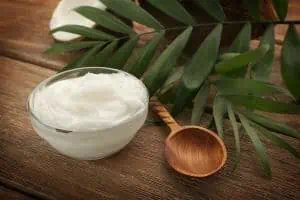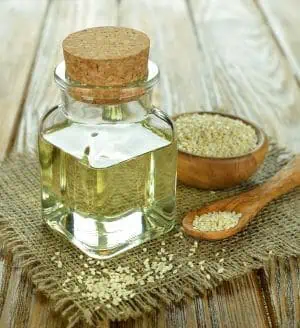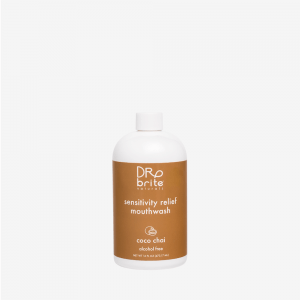Oil pulling isn’t just the latest natural tooth care fad being touted by Millenials and eco bloggers. It’s actually an ancient Ayurvedic folk remedy practiced in India. Promotors of this natural remedy claim it has many benefits, but is there any substance to these claims? And can they be backed up by science?
In this article, we’ll get to the bottom of tooth oil pulling and discuss all you need to know about this practice, including:
- Oil pulling benefits
- Coconut oil pulling dangers
- Whether or not it actually whitens teeth
- How to do oil pulling
After reading this article, we hope you feel armed with the information you need to decide if you want to buy that recycled glass jar of organic coconut oil on Amazon, or instead look around for some other alternatives.
In This Article
What is oil pulling?

Oil pulling involves swishing edible oil, usually coconut oil, around your mouth. This process is an ancient Ayurvedic practice to aid in maintaining good oral hygiene.
It is a therapy mentioned in the Charaka Samhita, one of the two foundational texts on Ayurvedic medicine. It was introduced in the Western world by Dr. Karach in the 1990s, as a way to fight against immune disorders and treat other illnesses.
Today, oil pulling is still used for its supposed health benefits, along with whitening teeth and freshening breath.
What are the health benefits?
There are a plethora of health benefits that can be gleaned from oil pulling, in fact, the Charaka Samhita is said to be able to cure around 30 systematic diseases, and in general Indian folk medicine it was used to:
- Prevent tooth decay
- Cure oral malodor
- Cure bleeding gums
- Prevent dry throat
- Prevent cracked lips
- Strengthen teeth and jaw
It was also used to cure ailments not directly related to the mouth, such as diabetes, migraines, and asthma.
The touted benefits of modern oil pulling do overlap and include:
Reducing harmful bacteria
The main reason that people oil pull today is to reduce the number of harmful bacteria that can be found in your mouth. The principal harmful bacteria targeted by this practice is streptococcus mutans. This is the main bacteria that aid in the buildup of plaque, which then can lead to tooth decay.
Reduce the risks of gingivitis
Gingivitis or gum disease, is a condition that happens when your immune system attacks the bacteria in the plaque around your gums and causes them to become red, inflamed, and even bleed. Oil pulling is said to reduce the inflammation in your gums and also the plaque that causes that inflammation.
Goodbye, bad breath!

Do you suffer from bad breath or halitosis? If so, first you should read our full guide to halitosis.
It also turns out that you may want to consider oil pulling to help freshen up that breath. That’s because foul-smelling breath is caused by a buildup of bacteria in your mouth that produce bad smells, so since oil pulling gets rid of some of that smelly bacteria, it also helps get rid of unpleasant odors in your mouth.
Keep in mind that all of the benefits mentioned in this article are to be taken with a grain of salt, as many professionals in the dental community say there isn’t enough science-based evidence to back up these touted benefits, and that some of the studies that have been produced aren’t very reliable.
Teeth whitening
One way some people use oil pulling in modern times is as a natural way to whiten teeth. The thinking behind oil pulling and teeth whitening is that oil helps get rid of plaque, which is one of the reasons your teeth may appear yellow. That being said, there really isn’t a lot of evidence to back up the whitening effects of coconut oil on teeth nor is there significant research that says that it doesn’t whiten teeth. For now, coconut oil teeth whitening is a subject that lacks enough research for a definitive answer.
You can watch this oil puller’s journey in the video below.
There’s a much faster way to get whiter teeth, while also benefiting from organic coconut oil—and that’s with Dr. Brite’s natural teeth whitening pens.
These pens are made with holistic ingredients like organic coconut oil, organic spearmint oil, and coffea arabica extract. Plus, you’ll notice your teeth turn a full two shades whiter after just two days of use!
That’s thanks to the food-grade hydrogen peroxide that works alongside the natural ingredients to deliver real whitening results.
Another benefit? These pens are cruelty-free, vegan, Non-GMO, gluten-free, and free of harmful chemicals.
You can get your natural whitening pen by clicking the button below, and use code DRBRITE10 to get 10% off your purchase.
Available research
Although there isn’t extensive research on the benefits of oil pulling, there are some studies that have been conducted. One of which is this one from the Journal of Indian Society of Periodontology, in which one group of people practiced oil pulling and the other used chlorhexidine mouthwash for up to two weeks. The results were that the number of streptococcus mutans, acid-producing bacteria known to cause decay, in the plaque of the group using oil pulling was significantly reduced.

Another study from the Journal of Natural Science, Biology and Medicine compared the effect of oil pulling in patients with plaque-induced gingivitis to a normal oral hygiene routine without oil pulling. The results of this study were that the reduction of plaque was more pronounced in the participants who practiced oil pulling.
Despite the existence of some studies that support claims that it is beneficial to oral health, you can also find plenty of scholarly articles, like this one from a doctor at the Department of Public Health Dentistry at Sri Siddhartha Dental College in India, that says that the existing studies are unreliable due to the misinterpretation of results, too small of sample size and absence of negative controls, among other factors.
There simply aren’t enough scientific studies that provide clinical evidence demonstrating that oil pulling is, in fact, effective in reducing dental caries, whitening teeth or improving oral health in general.
Are there any risks?
There are risks of oil pulling, cited by the ADA, including lipoid pneumonia, an inflammation of the lungs from fat particles, and another of the risks as diarrhea. Another concern is that the oil used for oil pulling might contain harmful additives. Harvard Medical School conducted a study of the Ayurvedic products available in South Asian grocery stores in Boston and found that 1 in 5 products contained potentially harmful levels of lead, mercury, and/or arsenic.
However, the greatest potential risk of oil pulling comes from using this practice to replace a healthy oral hygiene routine that includes proper brushing and flossing and regular visits to the dentist.
Have a look at the following table for a summary of the pros and cons of oil pulling. However keep in mind that due to the lack of scientific evidence, these are to be taken with a grain of salt.
Pros | Cons |
Decreases harmful bacteria in the mouth | Time consuming |
Helps heal bleeding and inflamed gums | Can cause stiff and sore mouth muscles |
Naturally whitens teeth | Not an efficient whitener |
Helps prevent cavities | Lack of evidence to back up health benefits |
Inexpensive | |
Can be done at home |
How to oil pull
If you do decide that you would like to try oil pulling, the good news is that it’s pretty easy to do. Just follow these steps:
- Measure out one tablespoon of edible oil, such as sesame, olive, or coconut oil. A lot of people prefer coconut oil because it tastes the best.
- Swish the oil around your mouth for up to 20 minutes, and don’t swallow any.
- Once your 20 minutes are up, spit the oil into the trash (spitting it into the sink can clog your drain).
- Rinse your mouth, thoroughly.
Have a look at how Sandy conducts her oil pulling routine in the video below:
Which oil is the best for oil pulling?
If you want to follow traditional Ayurvedic practices for your oil pulling routine, then you should use sesame oil. However, coconut oil is the most popular oil to use for pulling present-day. That’s because many people are drawn to its numerous antioxidants and anti-inflammatory agents. It also contains lauric acid, which is effective at killing harmful bacteria that could lead to tooth decay. And of course, coconut oil tastes better!

That being said, any edible oil will work, but for the best results, make sure to use unrefined, organic oil.
How often should I oil pull?
You should oil pull a few times a week, up to three times a day to achieve the potential effects of oil pulling. It should be noted that your mouth muscles may tire of swishing pretty quickly when you first try it, so you might have to slowly build up the time that you wish for.
Where to buy oil
While you can certainly use the coconut oil or sesame oil that you have at home to oil pull, there are also a plethora of options available in stores and on Amazon. If you’d like to try oil pulling with coconut oil, you can buy some all-purpose organic, extra-virgin coconut oil like this one from Viva Naturals. If you’re really a purist and want to use sesame oil as is used in Ayurvedic practices, then this organic sesame seed oil from Velona may be the product for you.

You can also purchase a natural mouthwash with organic coconut oil, like this one from Dr. Brite, that delivers the benefits of oil pulling as well as others like soothing sensitive teeth. It is a combination of organic coconut oil and aloe barbadensis, infused with organic Ayurvedic spices to support overall oral health.
You can also find pure oil pulling coconut oil like this ozone-infused coconut pulling oil, made specifically for swishing oil and oral care.
Conclusion
Oil pulling is not a practice that is backed up by tons of modern science, however, it is an ancient practice that comes from Ayurvedic medicine in India.
Those who have added oil pulling to their oral hygiene routine claim that its benefits include whiter teeth and an overall healthier mouth with less harmful bacteria. If you do want to try it, make sure to not swallow the oil, and to use oil that is edible and preferably organic as well.
You may also be interested in seeking out the services of a holistic dentist. But the most important thing to keep in mind—don’t use oil pulling to substitute daily brushing and flossing!
FAQs
What time of day should I oil pull?
You should oil pull first thing when you wake up in the morning, before eating or drinking if you want to follow traditional Ayurvedic practices. The idea behind this is that oil pulling helps get rid of harmful bacteria. This bacteria has built up in your mouth overnight, and when you spit it out, you’re also spitting out all of that bacteria. But if you eat before oil pulling, you just end up swallowing that bacteria anyways.
Do you brush your teeth before or after oil pulling?
You don’t need to brush your teeth before oil pulling, because it will, in theory, get rid of some plaque and bacteria for you. You can, however, brush your teeth afterward. If you don’t brush your teeth directly after oil pulling, make sure to rinse your mouth out really well. And whether you oil pull or not, you should brush your teeth when you normally would, at least twice a day.
What are the side effects of oil pulling?
Negative side effects can include dry mouth, muscle stiffness, exhaustion, loss of taste, excessive thirst, lipid pneumonia and diarrhea. That sounds pretty bad, but this is if you use it improperly. Using the wrong technique or performing it too many times or for too long throughout the day can lead to side effects. Your dentist might say that the most negative side effects of all oil pulling would be those that occur from using it to replace a proper oral hygiene routine that includes brushing and flossing twice a day.
Is oil pulling healthy?
There’s not enough scientific evidence to say definitively whether or not oil pulling is healthy. It is certainly an ancient practice and an important part of Ayurvedic medicine. Many people who do oil pull claim countless health benefits and even a whiter smile. And while there’s no concrete evidence that it’s healthy, there’s also not overwhelming evidence that it’s unhealthy, at least when done correctly. So if you want to try it, follow the instructions mentioned in this article and pull away! (And maybe talk to your dentist first).
Journal of Traditional and Complementary Medicine: Oil pulling for maintaining oral hygiene – A review. Consulted 13th February 2020.
Journal of Ayurveda and Integrative Medicine: Tooth brushing, oil pulling and tissue regeneration: A review of holistic approaches to oral health. Consulted 13th February 2020.
Journal of Indian Society of Pedodontics and Preventive Dentistry: Effect of oil pulling on Streptococcus mutans count in plaque and saliva using Dentocult SM Strip mutans test: a randomized, controlled, triple-blind study. Consulted 13th February 2020.
Journal of Natural Science, Biology and Medicine: Comparing the effect of coconut oil pulling practice with oil pulling using sesame oil in plaque-induced gingivitis: A prospective comparative interventional study. Consulted 13th February 2020.
ADA.org: Whitening. Consulted 13th February 2020.
Journal of the American Medical Association: Heavy metal content of ayurvedic herbal medicine products. Consulted 13th February 2020.
CNN: Does oil pulling work? Consulted 13th February 2020.




